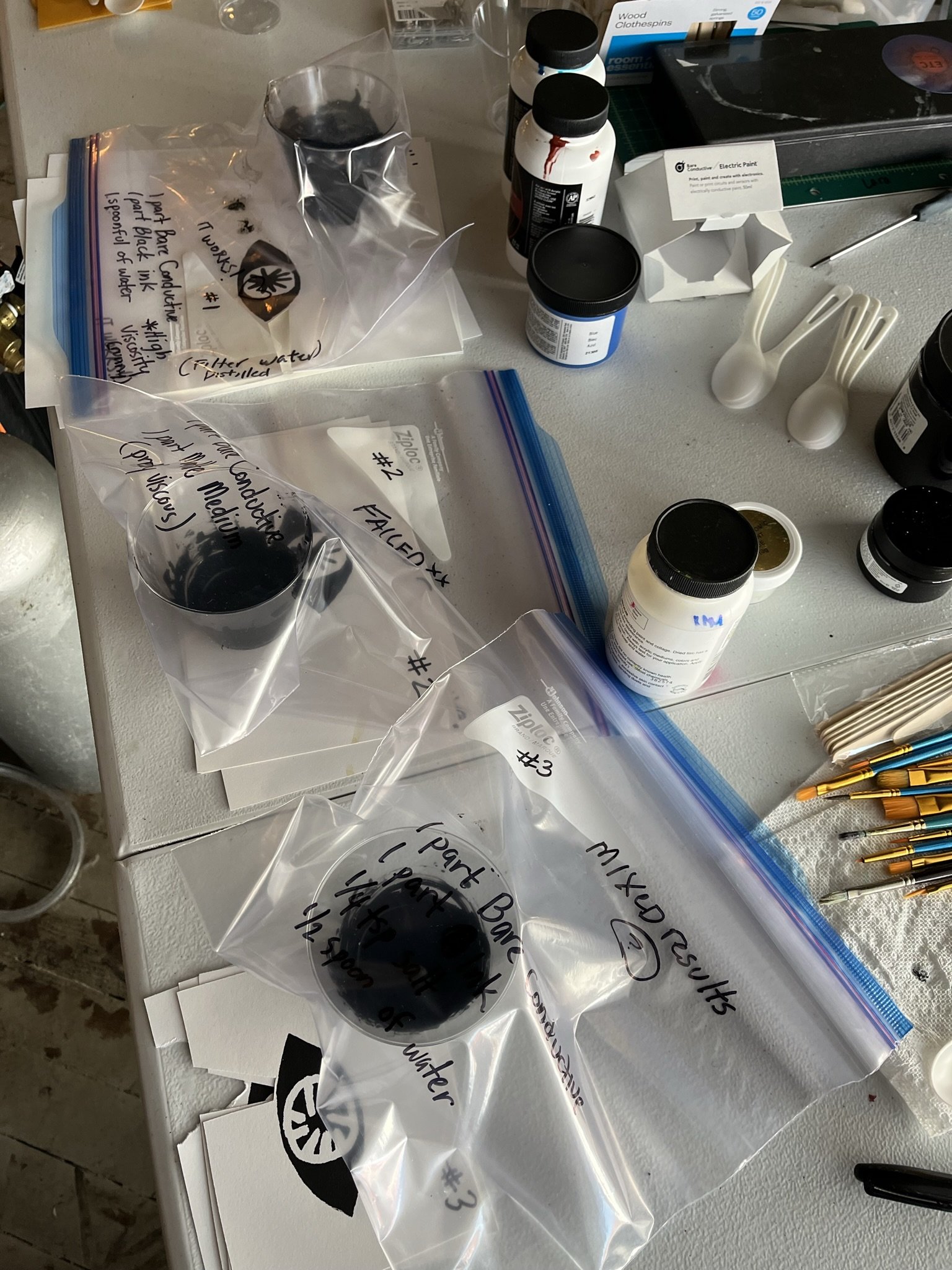How it began
The idea for this camp emerged out of conversations the organizers had as participants at eTextile Summer Camp in France. Seeking to nurture our own e-textiles community on the other side of the Atlantic, we decided to begin our own camp. Years later, the residency has been hosted at different places within the US including upstate New York and Vicksburg, Michigan. We are a bunch of fiber nerds, wool punks, and DIY electronics enthusiasts fascinated by the combination of technology and craft, whether material, social, cultural, technological, poetic, or aesthetic.
Each year, ETC is hosted in the US at spaces that provide housing for participants and plenty of room to have desks and build common workspaces within. Each year we also reevaluate and balance the incoming and outgoing costs, to see how this year is planned check out the cost breakdown.
Community / skill-sharing / exploration / collaboration
These are some words that inspire us and the electronic textile camp event. For the event’s duration, a community is created that fosters creativity and teaches new skills and perspectives regarding the wide field of e-textiles through skill sharing, discussion, and exploration.
Time at the residency is one for exploration. There is no expected project to be completed at the end but we do expect engagement with the materials, tools, and the space. We also kindly ask participants to dedicate some time to documenting processes and/or projects that are explored during their time at ETC. The website will be accessible to you for posting your work.
Open-source principles of sharing and iterative knowledge are encouraged through our website and during the event. The expected benefit from sharing process and work on the website is for visitors to gain inspiration and information. All open-source and copyrighted work that is integrated into work inside and outside of the eTextile Spring Break event must be appropriately adhered to under the referenced work’s license guidelines. There are many open-source licenses available for use. We recommend getting started with Creative Commons licenses that cover a wide range of usability.
Materials and tools
Many of the materials and tools are brought by the organizers.
There are items that we may have one, two, or a limited supply/variety of. We recommend tools and materials for you to bring and provide a variety of tools and materials on-site. As an example, check out the list of recommended and provided materials and tools from 2019.
The attendance fee and the organizer’s own resources are used to gather and purchase various tools and consumables for the participant’s use. After reviewing the applications we tailor the material list with the intent to acquire a base of tools and materials that will accommodate the participants’ interests and skills.
ETC strives to provide the following workspaces for everyone’s use during the residency: sewing, weaving, knitting, electronics, tabletop CNC cutting, and screen printing. Irons and ironing boards will be set up and available along with heat-activated adhesive film.
If we find something lacking or there is a special unforeseen interest that we can not cover, we may call out to participants to bring extras (soldering irons, knitting needles) or a special tool.
The residency is stocked with various conductive and resistive yarns, fibers, and textiles. Electronic consumables such as solder, capacitors, resistors, LEDs, popular ICs, wire, etc. will be provided. Along with an array of sensors, microcontrollers, ICs, and other fun items either purchased or brought from the organizers’ own stashes.
Workshops
Based on application responses the organizers will reach out to participants to ask if they want to teach a workshop. Past workshops have included:
Pattern Making: Tailoring Trousers
Biofabricating Matter
PCB Design and Prototyping
E-textile Sound and Music
Thermochromics + Heating Circuits
Weaving Intensive
Exhibit
The community we create includes engaging people outside of the residency. One way to do that is through an exhibit and social event where we invite visitors to engage with us and our work. For the exhibit, we may invite all participants to bring a piece of their work or to put an item or method of process that you worked on during the residency on display to share. The exhibit also becomes a way for the participants of ETC to get to know each other’s work.
During the exhibit, we look to educate the community on what e-textiles are and may have demo tables where people learn how to needle felt, screen-print with thermochromic inks, etc.
Lodging
Most accommodations end up being shared buildings that have communal kitchens, bathrooms, and common rooms. Visitors or partners will need to find their own accommodation and can not stay on the premise of the residency.
Meals
ETC plans for communal dinners, all other meals are the responsibility of the participants. Communal kitchens are usually available for use through the provided lodging as well grocery stores within walking distance of the main workspaces. We also do our best to provide snacks, coffee, and tea for breaks and socializing.
Snapshots from previous years
A resident sharing work they brought to show-and-tell.
Cooking up and laying down bio-materials during a workshop.
A knitting station overlooking part of the general workspace.
Notes and samples from experiments done over the week using neutral and conductive pigments.
Resident’s work displayed during the public exhibit.
Shelves of conductive fibers, tools, and materials for residents to experiment and play with.





